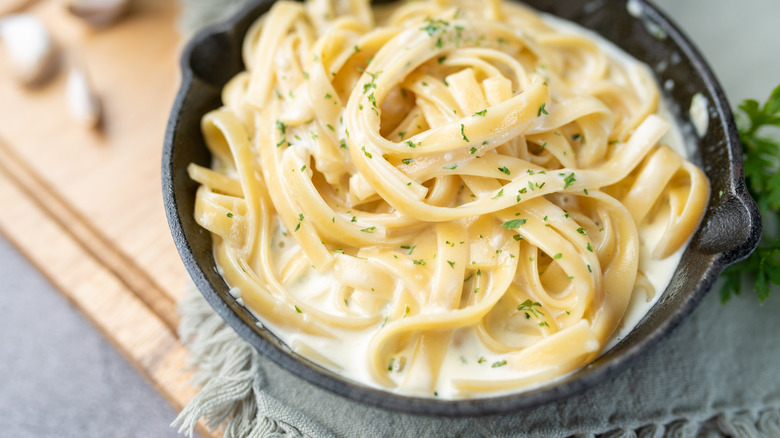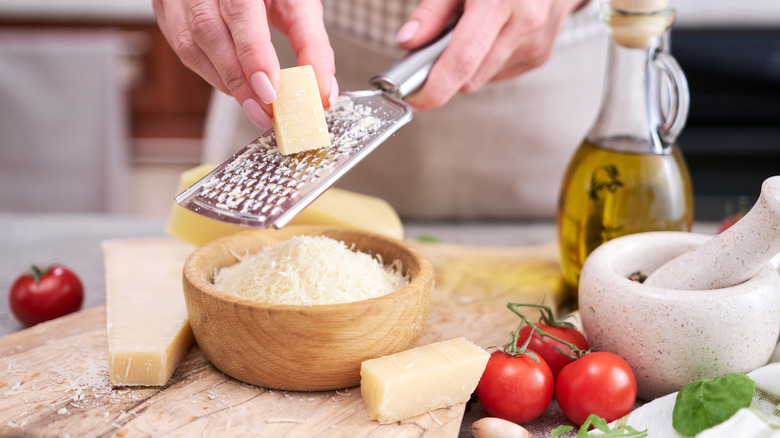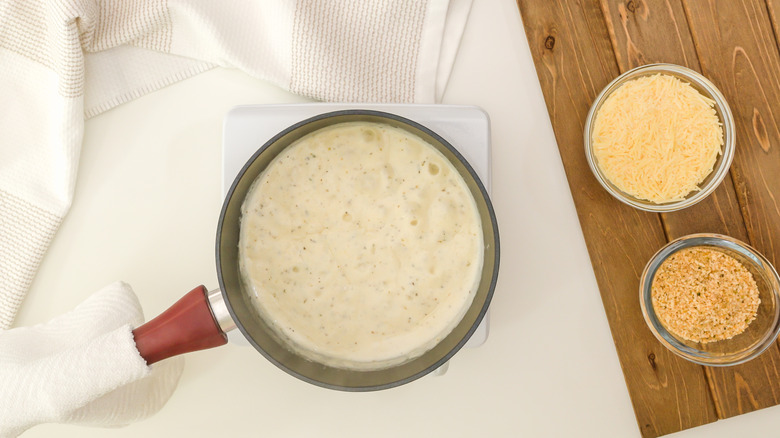The Only Way To Thicken Alfredo Sauce According To A Chef
Whether you prefer penne or fettuccine, a hearty plate of pasta with Alfredo sauce always hits the spot after a long day. Tasty as is or made more filling with steamed broccoli or strips of crispy breaded chicken, the star of this comforting dish is its rich, creamy sauce. Despite the fact that Olive Garden's signature Alfredo sauce used to be shrouded in secrecy, the savory stuff is generally straightforward in terms of its ingredients, which include butter, heavy cream, garlic, Parmesan cheese, and some seasonings and herbs like parsley. However, it can still be deceptively difficult to get right. Besides flavor, of course, the sign of a restaurant-worthy cream sauce usually comes down to consistency; Alfredo sauce shouldn't be so thick that it's unappetizingly goopy or so thin that it can't cling to pasta properly.
In case you ever run into the latter problem, Chowhound asked an expert about the best way to thicken Alfredo sauce. Chef Jasper J. Mirabile Jr., owner and chef at Jasper's Italian Restaurant in Kansas City, Missouri, and host of "Live! From Jasper's Kitchen Radio," shared his secret to saving a runny cream sauce: He lets the cheese do the heavy lifting. "When it comes to a cream sauce, using a great cheese that has been grated on the microplane does the job really well," he said. As it turns out, the solution to a thin Alfredo sauce has been right in front of you — and already in the sauce — all along.
Thicken Alfredo sauce with grated cheese
Cream-based sauces can be finicky from the start — especially if you substitute heavy cream for something that's lower in fat and more likely to curdle. But if you're struggling to fix a runny Alfredo sauce, and the consistency still doesn't thicken after a little starchy pasta water and patience, you'll have to take additional measures. Instead of introducing new ingredients and risking a new batch of problems, Chef Mirabile suggests turning to cheese, which is already in the sauce.
"When teaching my cooking classes, I always tell everyone that Parmesan Reggiano and grated pecorino Romano are my go-to cheeses for thickening sauces," he emphasized. A staple ingredient in Alfredo sauce, adding more Parmesan into the saucepan is a surefire way to thicken the rich emulsion until you achieve your desired consistency. But if you're short on Parmesan or simply want to introduce bright and grassy flavor notes, pecorino Romano — popularly used in cacio e pepe and made from sheep's milk — is another worthwhile thickener for the creamy sauce.
Since both cheeses are rather dry and can be slow to melt, grating them can help incorporate them more easily into Alfredo sauce. Chef Mirabile recommends using a microplane, which he notes practically turns the cheese into a fine dust. Using grated cheese can also allow you to take your sauce off the hot stovetop sooner, which can save it from breaking, may also help with thickening, and ensures you can eat your delicious pasta ASAP.
Why cheese is the best way to thicken Alfredo sauce
All across the internet there are suggestions on how to thicken a cream-based sauce, from reducing it over heat to introducing starch to absorb excess liquid. But Chef Mirabile's tip on using cheese stands out as the best solution for a few reasons. Not only is it extremely easy to add grated cheese to a runny Alfredo sauce, but by using an ingredient that's already present in it, you're able to stay true to the sauce's original flavor. Plus, who doesn't love an extra rich and cheesy dish, especially if you're eating a pasta that pairs well with cream sauce? A little more Parmesan or pecorino also doesn't risk messing up the sauce's consistency even more, unlike some other thickening methods.
A cornstarch or flour slurry, for instance, are common ways to thicken Alfredo sauce using starch, but they're not without their flaws, which is why some people are against them — including Chef Mirabile. "I would never use cornstarch, arrowroot, or flour," he told Chowhound. After all, too much cornstarch or raw flour could compromise a pasta sauce's flavor or texture. If used with a heavy hand, not stirred in thoroughly, or left uncooked (in the case of flour), the starches may make the sauce grainy or lumpy. When overcooked, the starches can also become ineffective at thickening — another problem that you won't run into if you opt for the simpler and chef-approved strategy of adding more cheese.


